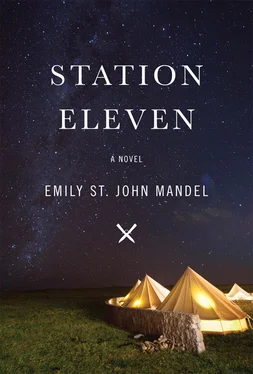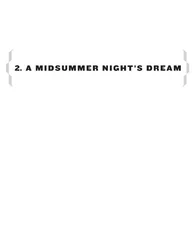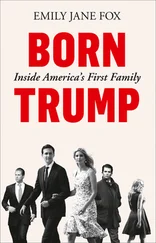The paperweight was a smooth lump of glass with storm clouds in it, about the size of a plum. It was of no practical use whatsoever, nothing but dead weight in the bag but she found it beautiful. A woman had given it to her just before the collapse, but she couldn’t remember the woman’s name. Kirsten held it in the palm of her hand for a moment before she turned to her collection.
She liked to look through the clippings sometimes, a steadying habit. These images from the shadow world, the time before the Georgia Flu, indistinct in the moonlight but she’d memorized the details of every one: Arthur Leander and his second wife, Elizabeth, on a restaurant patio with Tyler, their infant son; Arthur with his third wife, Lydia, a few months later; Arthur with Tyler at LAX. An older picture that she’d found in an attic stuffed with three decades’ worth of gossip magazines, taken before she was born: Arthur with his arm around the pale girl with dark curls who would soon become his first wife, caught by a photographer as they stepped out of a restaurant, the girl inscrutable behind sunglasses and Arthur blinded by the flash.
3. I Prefer You With a Crown
THE PHOTO FROM THE TABLOID:
Ten minutes before the photograph, Arthur Leander and the girl are waiting by the coat check in a restaurant in Toronto. This is well before the Georgia Flu. Civilization won’t collapse for another fourteen years. Arthur has been filming a period drama all week, partly on a soundstage and partly in a park on the edge of the city. Earlier in the day he was wearing a crown, but now he’s wearing a Toronto Blue Jays cap that makes him look very ordinary. He is thirty-six years old.
“What are you going to do?” he asks.
“I’m going to leave him.” The girl, Miranda, has a recent bruise on her face. They’re speaking in whispers to avoid being overheard by the restaurant staff.
He nods. “Good.” He’s looking at the bruise, which Miranda hasn’t been entirely successful in concealing with makeup. “I was hoping you’d say that. What do you need?”
“I don’t know,” she says. “I’m sorry about all this. I just can’t go home.”
“I have a suggestion—” He stops because the coat-check girl has returned with their coats. Arthur’s is magnificent, smooth and expensive-looking, Miranda’s a battered peacoat that she found in a thrift store for ten dollars. She turns her back on the restaurant as she puts it on in an effort to hide the torn lining — when she turns back, something in the hostess’s smile suggests that this effort was in vain — while Arthur, who by this point in his life is extravagantly famous, flashes his best smile and palms a twenty to the coat-check girl. The hostess is surreptitiously hitting Send on a text to a photographer who gave her fifty dollars earlier. Outside on the sidewalk, the photographer reads the message on his phone: Leaving now .
“As I was saying,” Arthur murmurs, close to Miranda’s ear, “I think you should come stay with me.”
“At the hotel? I can’t—” Miranda whispers.
“I insist. No strings attached.”
Miranda is momentarily distracted by the coat-check girl, who is staring adoringly at Arthur. He whispers, “You don’t have to make any decisions right away. It’s just a place you can stay, if you’d like.”
Miranda’s eyes fill with tears. “I don’t know what to—”
“Just say yes, Miranda.”
“Yes. Thank you.” It occurs to her as the hostess opens the door for them that she must look terrible, the bruise on her face and her eyes red and watery. “Wait,” she says, fishing in her handbag, “I’m sorry, just a second—” She puts on the enormous sunglasses she’d been wearing earlier in the day, Arthur puts his arm around her shoulders, the photographer on the sidewalk raises his camera, and they step out into the blinding flash.
“So, Arthur.” The journalist is beautiful in the manner of people who spend an immense amount of money on personal maintenance. She has professionally refined pores and a four-hundred-dollar haircut, impeccable makeup and tastefully polished nails. When she smiles, Arthur is distracted by the unnatural whiteness of her teeth, although he’s been in Hollywood for years and should be used to it by now. “Tell us about this mystery brunette we’ve been seeing you with.”
“I think that mystery brunette has a right to her privacy, don’t you?” Arthur’s smile is calibrated to defuse the remark and render it charming.
“Won’t you tell us anything at all about her? Just a hint?”
“She’s from my hometown,” he says, and winks.
It’s not a hometown, actually, it’s a home island. “It’s the same size and shape as Manhattan,” Arthur tells people at parties all his life, “except with a thousand people.”
Delano Island is between Vancouver Island and mainland British Columbia, a straight shot north from Los Angeles. The island is all temperate rain forest and rocky beaches, deer breaking into vegetable gardens and leaping in front of windshields, moss on low-hanging branches, the sighing of wind in cedar trees. In the middle of the island there’s a small lake that Arthur always imagined was formed by an asteroid, almost perfectly round and very deep. One summer a young woman from somewhere else committed suicide there, left her car parked up on the road with a note and walked into the water, and then when divers went after her they couldn’t find the bottom of the lake , or so local children whispered to one another, half-frightened, half-thrilled, although upon reflection, years later, the idea of a lake so deep that divers can’t reach bottom seems improbable. Still, the fact is that a woman walked into a lake that wasn’t large and no one found the body for two weeks despite intensive searching, and the episode sparks up against Arthur’s childhood memories retrospectively and leaves a frisson of darkness that wasn’t there at the time. Because actually from day to day it’s just a lake, just his favorite place to swim, everyone’s favorite place to swim because the ocean is always freezing. In Arthur’s memories of the lake, his mother is reading a book under the trees on the shore while his little brother splashes around with water wings in the shallows and bugs land fleetingly on the water’s surface. For unknown reasons there is a naked Barbie doll buried up to her waist in the dirt on the lake road.
There are children on the island who go barefoot all summer and wear feathers in their hair, the Volkswagen vans in which their parents arrived in the ’70s turning to rust in the forest. Every year there are approximately two hundred days of rain. There’s a village of sorts by the ferry terminal: a general store with one gas pump, a health-food store, a real-estate office, an elementary school with sixty students, a community hall with two massive carved mermaids holding hands to form an archway over the front door and a tiny library attached. The rest of the island is mostly rock and forest, narrow roads with dirt driveways disappearing into the trees.
In other words, it’s the kind of place that practically no one Arthur encounters in New York, Toronto, or Los Angeles can fathom, and he gets a lot of uncomprehending stares when he talks about it. He is forever trying to describe this place and resorting to generalizations about beaches and plant life. “The ferns were up to my head,” he tells people, performing a gesture that suggests greater and greater height over the years until he realizes at some point in his midforties that he’s describing plants that stand seven or eight feet tall. “Just unbelievable in retrospect.”
“It must’ve been so beautiful” is the inevitable reply.
Читать дальше












